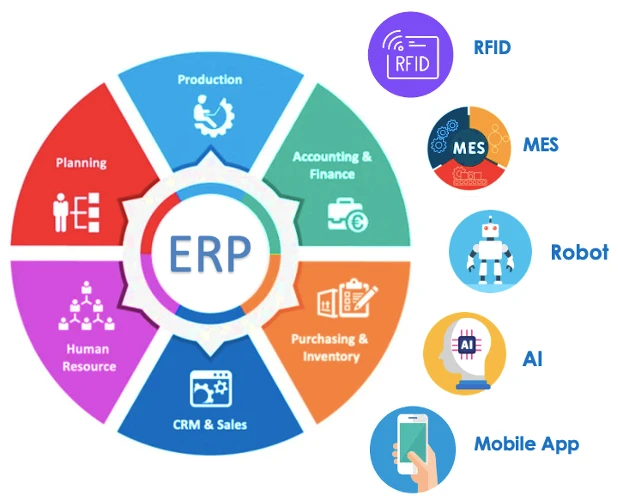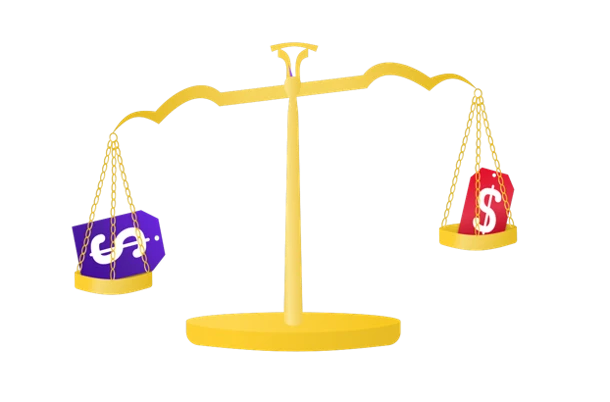With more than 2 decades of experience in the field of Management Software Consulting and Digital Transformation Solutions for many large enterprises in Vietnam in general and Enterprise Resource Planning System ERP in particular. Through cases of enterprises unsuccessfully implementing ERP software (especially manufacturing enterprises), we would like to temporarily summarize and draw lessons to help enterprises avoid this mistake. This failure is very painful because the amount of money that enterprises spend on investment can be up to millions of US dollars, not only is it a loss of money but even more so, a loss of effort, time and resources. Most importantly, it makes enterprises lose faith in Digital Transformation, losing the opportunity to rise and develop further at that time!
Currently, ERP consulting and implementation projects usually have the scope of Basic (large circles) and Advanced (small circles) modules as shown below:

We temporarily classify unsuccessfully implemented ERP projects for businesses into 3 types as follows:
- Complete failure : The business loses money (Copyright costs & consulting costs according to the project implementation phase) without being able to use any software subsystem, and cannot get the money back from the ERP consulting and implementation company.
- Partial application : Enterprises can only use basic software subsystems such as CRM & Sales - Purchasing - Inventory - HR - Accounting & Finance - Tax. Software modules serving production such as Planning (MRP, MDS, MPS...) & Production Management; Costing cannot run because the software cannot run according to management needs.
- Almost fully applied : The enterprise fully applies the software subsystems (as per the signed contract). However, the usage is still forced, users feel unsatisfied, for example, the process is not really close to reality; the software lacks features; lacks reports or reports do not meet requirements... The ERP implementation unit does not customize or requires unreasonable costs, or is not capable of customizing according to customer needs!
In this article, based on many years of practical experience, having witnessed and known about unsuccessful ERP projects (especially manufacturing enterprises) in Vietnam. To help customers avoid making the same mistake, "losing money and suffering", we would like to temporarily summarize and draw conclusions about the mistakes that enterprises often encounter (Causes from the Supplier, Consulting Unit, Implementation Unit... are listed in another article) as follows:
1. Business owners think that money can buy everything, including ERP systems?!
Often found in Vietnamese corporations and companies with famous, long-standing brands, with abundant investment budgets for information technology and management software. Business owners and Board of Directors have a simple way of thinking, viewing the ERP system as an investment project for factories, machinery and equipment... thinking that once purchased, there will be a team of experts from the company to train, instruct on how to use and transfer it. This business often targets foreign, world-famous ERP software because they see foreign partners applying it very well and effectively. Business owners think that large corporations in the world (in the same manufacturing industry) have applied it successfully for many years, now buying this ERP system to deploy for the company to use according to that "Best Practice" is too good, both fast and no need to think too hard!

However, reality is not like a dream! Around the beginning of 2000, I knew a famous private beverage manufacturing corporation in Vietnam signed a contract with a consulting company to implement ERP specializing in the beer and carbonated beverage manufacturing industry... in the UK (this ERP has been successfully applied to many famous brands in the world) but in the end had to stop halfway because the system could not be customized according to the very specific requirements of Vietnamese enterprises. On the other hand, 02 consulting experts from the UK flew over to implement ERP, charging by the hour (300 USD/hour) and by the day (2,400 USD/day), the consulting cost was much higher than the original plan (because of the arising special requirements), so the business owner decided to stop!
Around 2010, I witnessed a very famous Enterprise in the industrial plastics industry in Saigon, investing in the world's leading ERP Solution with a huge amount of money at that time (more than 1.5 million USD for ERP & Data Center copyright, not to mention the cost of establishing and paying salaries for the internal ERP Board, which were CIOs and IT with experience in ERP) but completely failed after 2 implementations with 1 domestic ERP Partner and the second implementation Partner from Singapore.
Not to mention, in early 2025, we signed a contract to deploy ExpertERP for a large Vietnamese plastic packaging enterprise specializing in the production of fertilizer bags, rice, and agricultural products. They are using the Corporation's foreign ERP software but it can only be applied to a few departments such as Sales - Purchasing - Inventory... While the most important management area is Production Planning & Production Management (QA/QC; Statistics), it cannot be applied, and the cost cannot be calculated. While every year they have to pay a not small amount for Software Maintenance!

ERP is not just software, the ERP system is the actual operating process of the company, affecting the entire business operation, changing the thinking, habits and working methods from employees to middle and senior managers and business owners. In short, having money can help businesses successfully invest in equipping advanced, modern machinery, equipment, technology... on par with the world, but having money does not necessarily mean being able to invest and successfully apply the ERP management system!
2. Low investment budget so choose the cheapest ERP implementation unit!
Contrary to the above lesson, this mistake is often found in businesses that want to implement ERP but set the budget too low, or decide to choose an ERP Provider based on the core criteria that the project cost must be CHEAPEST or LOWER! without paying attention to other important factors such as:
- Has that supplier ever successfully implemented ERP (full modules including planning - production - costing...) for a manufacturing enterprise in the same industry, with a similar scale as yours?
- Must verify the actual running of the ERP system by visiting and directly contacting users using the software and BOD of the case study.
- Does the Supplier's Consulting & Implementation team have "real-life" experience in this industry? Can they review & advise the best management solution for the business? Or do they just implement the software according to the description & requirements of end-users (with a narrow and short-term vision)?
- Can that ERP company go with your business for a long time? Or will it run out of investment resources and go bankrupt halfway?
We see that most ERP projects that are chosen based on this criterion will fail, such as being abandoned halfway, or the business can only apply basic modules. Almost all customers who are currently applying GMC's ExpertERP software well have failed when implementing ERP with the criterion of choosing an ERP Provider with a cheap or lower price!

Occasionally, we also meet businesses where the Boss comes from a manufacturing background, they are confident in their experience so they choose to hire a processing company or a programming group to write software according to their needs (the initial investment cost will be cheaper if choosing a ready-made ERP). The business will provide the process, current status description, needs, reports... for the programmer to write exactly as they are. Usually, these software will initially run the modules: Sales management - Purchasing - Inventory - Delivery - QA/QC - Production statistics... but will get stuck at the most difficult stage which is Production planning such as MRP, MPS, MDS and the cost is almost impossible to run, not to mention developing new systems integrated on the operating ERP platform such as Mobile App, MES... Usually, after about 3 to 5 years, the software at this enterprise falls into the state of "It's a pity to abandon it, but it's a sin to keep it", abandoning it is a pity to waste costs and investment efforts, but further development is not possible!

In addition, the biggest problem in Vietnam today is that there are many consulting and software implementation companies that claim to be and loudly advertise themselves as consulting and implementing ERP in general and ERP production management in particular. For example, there are many companies that only specialize in CRM software; Sales management, purchasing, inventory, accounting, tax reporting... also loudly advertise themselves as consulting and implementing ERP units. Or there is a foreign ERP that has been loudly promoting recently as "Smart production management solution for all businesses"... While in reality, the software has not yet met the standards of an ERP specializing in production management and production planning! These companies often quote low prices for implementing ERP production management, even several hundred million. The end result is that businesses lose money, effort, time, trust, and development opportunities.
3. The business leadership is unwilling to change, lacks determination and does not devote much time and effort to the ERP project.
As mentioned in part 1, ERP is not a software tool, it is the actual operating process of the business. The company decides to apply ERP, which means it must accept changes in the operating processes of each department and the coordination of the entire company. It is impossible to think that the ERP system must be adjusted exactly the way the company has been operating from the past until now! Or I have always managed with Excel, accounting software, warehouse management... so ERP must be done the same way because I find it good and familiar like that!
There are even many business owners and business leaders who are used to the non-process management method, so they still manage in the old way and do not accept changes according to the new process. There are company directors who are used to signing documents directly, even though they already have an ERP system, but they still sign the same way, so how can they motivate their employees to change? If they want to force the entire company to use the new management system, the BOD must be decisive; set an example, be the locomotive to pull the whole "train" along!

There are many business owners and business leaders who sign a contract with a supplier and then leave the implementation of the ERP project to the partners and employees in the company. To successfully apply ERP, the project manager (PM) on the business side must have a deep and broad understanding of the current situation of the company, understand the difficulties and weaknesses the company is facing, the goals that the company needs to achieve when applying the ERP system... The PM and Core Team on the customer side must be close, determined, dedicated and really spend a lot of time on the project. Because the implementation of an ERP project in general and ERP for production management in the fastest way takes 5-6 months or can last up to 1-2 years, it requires the PM and Core Team, especially the Board of Directors of both sides to be persistent, patient, and "work together" to hope for success!
4. Department and Division managers are reluctant to change and do not want to apply ERP for various reasons.
There is a group of key leaders, holding key and important positions (usually long-time employees who have "shared the hardships" since the business owner first started) who do not want to apply the ERP system to manage the entire business for many reasons. Here are some common reasons:
- One: That person is old, likes to follow habits that have been developed for many years, is proud of his management experience... Does not want to change and does not accept new management methods.
- Second: That position is very important to the company, without them, it will greatly affect the entire production and business activities of the unit. However, it is all in that person's "head", they do not share or train knowledge and experience to others.
- Third: The person who holds all the company's operational data, is responsible for collecting and building management reports for the Board of Directors.

In general, those people do not want to lose the feeling of being an “important person” in the company, do not want to lose the “power” or even the “perks” that they have! During many years of participating in ERP projects, we would like to mention a few specific cases as follows:
- More than 15 years ago, after working with the Deputy General Director in charge of the ERP project of a famous State-owned enterprise producing electric cables, our Consulting Team was introduced to continue working with the Accounting Department. The Chief Accountant only said one sentence: "I don't want to use ERP, I think MISA is still using it well!". The Chief Accountant of that company was appointed by the Ministry of Industry and Trade, the Board of Directors had no right to replace anyone else. That ERP project failed from the beginning!
- Around 2009, we signed a contract to deploy Microsoft Dynamic AX for a famous seafood processing company in Binh Thuan. Before, the company used Vietnamese accounting software. The Chief Accountant (CAO) held all the operational data and was the only one who made reports to the company's Board of Directors. The General Director assigned CAO to be the Project Manager (PM) on the customer side to work with us. On the surface, CAO was very happy to cooperate, but on the inside, he deliberately prolonged the time when providing data, tried to introduce other suppliers...
- A few years ago, we deployed the ERP system for a large Vietnamese furniture manufacturing enterprise with nearly 2,000 workers. The company purchased round wood (acacia, eucalyptus...) to saw, dry, and supply plywood to the company's production workshops. The person in charge of the wood drying workshop is a relative and has worked with the Owner since its establishment, so he is very reputable and trusted. When deploying ERP, he did not participate and the workshop staff also refused to enter data into the software, still using Excel files for reporting. In early 2025, the company discovered a large discrepancy between reported data and actual inventory, but it was too late!

Above are some practical examples and also lessons for businesses that need to apply ERP management systems in Vietnam. So how to choose a reputable ERP consulting and implementation unit (especially ERP production management) to ensure the possibility of successful ERP project implementation? You can refer to our article via the following link: https://experterp.vn/bi-quyet-giup-doanh-nghiep-chon-lua-don-vi-tu-van-erp-uy-tin--dam-bao-trien-khai-thanh-cong-du-an-233-16.html
There is a very important question: What does your business need to prepare to ensure successful ERP implementation? We will have a next article to answer this interesting question, we hope you will read it!
In short, if your business wants to learn about ERP, especially the ERP solution for specialized production management, please contact us via the information below. With Expert ERP software that has successfully proven itself to many customers and the ability to consult and implement ERP for production management for many years, along with dedicated, sincere and honest consulting services. We will not disappoint you!
GMC SOFTWARE SOLUTIONS JOINT STOCK COMPANY
Address: 4th Floor, Success Building, 21A Go Dau, Tan Quy Ward , Tan Phu District , HCMC
Tel: 028 6660 3006
Mobile: 0918 050 964
Email: Nghia.tran@experterp.vn
Website: https ://experterp.vn & https ://gmc.solutions